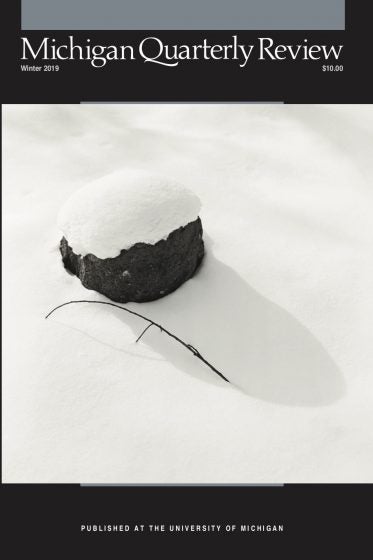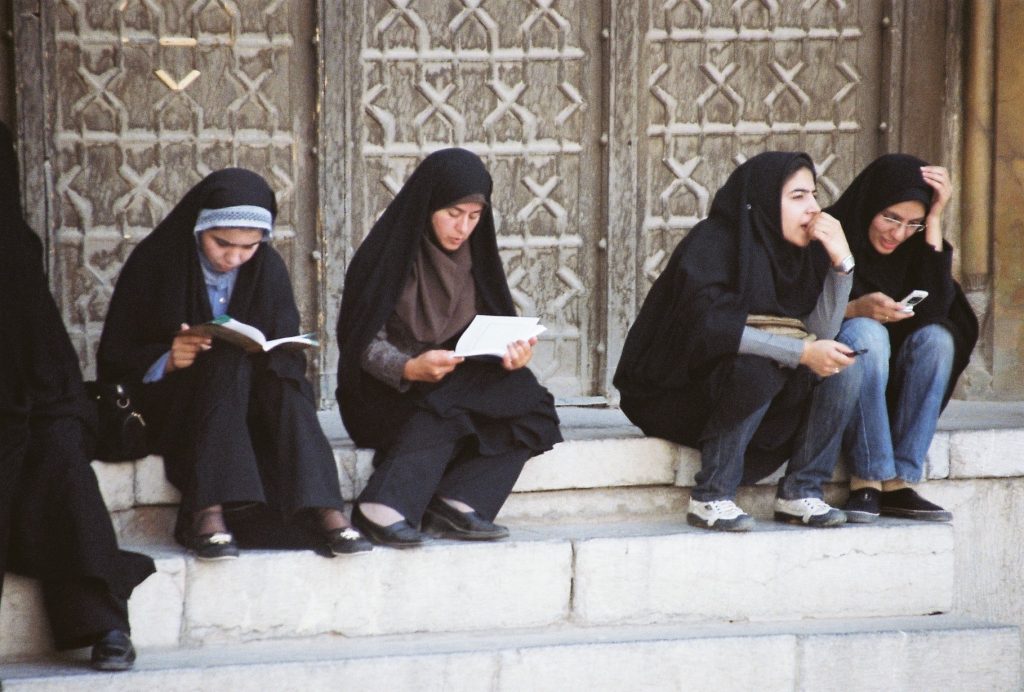“Worshippers,” by Caitlin Kindervatter-Clark, appears in the Winter 2019 Issue of MQR.
After half a lifetime of unsuccessfully trying to control my drinking, I decided to surrender the whole endeavor and quit. In the wake of this decision, my ego underwent a partial collapse. Drinking had been a major part of how I defined myself; it was what I did with my free time and how I connected with others. Without alcohol, it was hard to say who I was. I was newly humbled, no longer the drunk center of attention or hungover locus of shame, but a person among people, trying to get better.
Around the same time, I was assigned to teach the Saudi students. They immediately defied my expectations. Some were definitely rich, but there were fewer spoiled brats than there had been in classes I’d previously taught at the University of Virginia. There were also women in the group— only two the first year, but six the following one. Although education is gender-segregated throughout most of Saudi Arabia, this isn’t the case for the scholarship program, where women and men study side-by-side.
But most importantly to me as a teacher, the students almost immediately began writing emotionally powerful essays. Several Shiite students wrote about ISIS bombing mosques in their hometown. Two Sunni students wrote about changing their perspectives on Shia based on close friendships they’d developed with students in our class. One student wrote about finding passages in the Quran that seemed to permit the theory of evolution and homosexual relationships. A female student wrote about being berated by religious extremists back home for traveling abroad without a male relative. Others wrote about controlling parents, family members struggling with mental illness, and hopes for their country’s future—that it would one day become, in the words of one, “more than just a giant gas station.”
There were also lighter topics and abundant humor. One student wrote about trying her first (beef ) hotdog, despite being horrified by its name. Another student wrote an essay arguing (convincingly) that Saudis love soccer more than Brazilians. They wrote about Snapchat, graffiti, and Nicki Minaj. They wrote about topics familiar to me in new and funny ways, and topics foreign to me in such familiar terms that my heart ached. After months of reading their essays in various incarnations, I came to feel almost maternally protective of my students. I saw their potential alongside their vulnerability, places where they were making the same mistakes I’d made and places where they would easily surpass me.
My maternal feelings sometimes led to conflicts. I got into an argument with another teacher about allowing the students to pray in the faculty room. For a while, they had the code to the door’s padlock and would come in throughout the day to pray. They always asked first: “Is it okay if I pray in here?”
I thought it was fine. The other teacher did not. Each time a student came in to pray, she complained about how students should not be allowed in the faculty room. I pointed out that I wasn’t the one to give the students the code; it was a decision made by the program director and building manager. Back and forth we went, with me growing increasingly angry, my heart rate quickening and voice quavering.
While I argued that providing our students a place to pray was a religious freedom issue, it went beyond that. Since getting sober, I’d begun to pray regularly, sometimes compulsively. These were not the kinds of desper- ate, sporadic prayers I used to say before I quit drinking, when I’d beg a God I wasn’t sure I believed in to repair a relationship I might have destroyed or to let me have not said or done the thing I thought I remembered saying or doing the night before.
Now, I was not praying for things to happen or to not have happened, but for the peace of mind to get out of my own way. My prayers were more mantras than requests, something to focus on when my thoughts seemed in danger of spinning out of control. I played the most helpful prayers on an incessant mental loop: the Serenity Prayer; the Third Step prayer; Metta prayers for loved ones, strangers, enemies. To whom or what I was praying was often beside the point. “I used to believe that prayer changes things,” said Mother Theresa. “But now I know that prayer changes us, and we change things.”
Prayer was changing me. It was giving me something to do besides dwell on myself all the time, a source of relief besides drugs or alcohol. It was giving me space to pause when I thought I’d erupt with rage. Without prayer, who knows what I might have said to that other teacher. I may have lost my shit completely.
While my students prayed differently than I did, I suspected they were receiving similar benefits. They were in the midst of applying to colleges: a stressful and dehumanizing process. Their days were filled with worries about test scores, application deadlines, and how to present themselves as well-rounded within narrow confines. Meanwhile, they were thousands of miles away from their families and home country, and some of them were losing friends and neighbors to extremism and violence. Giving them a space to pray seemed the least we could do.
Ultimately, though, the other teacher won. The padlock code was changed and a sign was posted on the faculty room door, saying it was for staff use only. My students now prayed in the backs of classrooms or abandoned hallways. I apologized to them on the other teacher’s behalf.
“She’s very dogmatic,” observed Yasir, who never failed to find an opportunity to practice his SAT words…
Purchase MQR 57:5 or consider a one-year subscription to read more. This essay appears in the Winter 2019 Issue of MQR.





